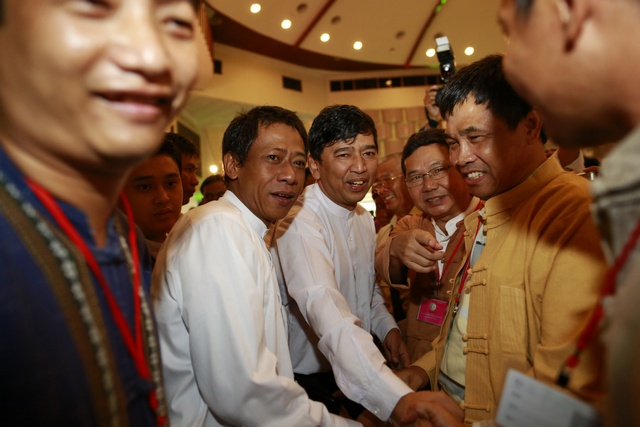President’s Office Minister Aung Min attended the “Silver Jubilee for Four Eights Democracy Movement” on Wednesday where he discussed cooperating with the event’s organisers for “national reconciliation”, as human rights groups called on the government to launch fresh investigations into the military’s violent crackdown on protestors in 1988.
During Aung Min’s meeting with the Silver Jubilee Convention’s committee members, the minister expressed interest in cooperating further with civil society groups to promote peace and reconciliation in Burma, said 88 Generation Students Peace and Open Society’s Ko Jimmy.
“I concluded that the government showed its willingness to cooperate as a result of the meeting, which focused on peace and national reconciliation,” said Ko Jimmy, adding that Aung Min addressed Burma’s ongoing peace process and nation building as the country continues with its reform process.
“I am satisfied with these discussions. Most attendees, including some Was, are interested in taking part in the talks and joined the ethnic affairs section.”
Thousands of people, including representatives from political parties, ethnic organisations and exiles, flocked to the Myanmar Convention Centre in Rangoon for the three-day commemoration of the 1988 demonstrators that were violently crushed by the military.
[related]
One of the most prominent student leaders from the ‘88 uprising Min Ko Naing struck a somber note as he honoured the more than 3,000 people who were killed during the military crackdown.
“We can hand over the spirit of resistance against injustice, oppression and opportunism to the next generation,” said Min Ko Naing during an interview with DVB on Tuesday.
As people across Burma paid tribute to the hundreds of thousands of protestors who participated in the popular demonstrations held across the country 25 years ago, human rights groups called on the government to launch fresh investigations into the military’s savage suppression of the uprising.
“The mass killings 25 years ago in Burma are an unaddressed open wound that challenges the government’s rhetoric of reform,” said Brad Adams, Asia director at Human Rights Watch, in a press release published on Tuesday.
“The government should shed itself of 50 years of denial about military abuses by showing that it stands with the Burmese people and not with the killers of the past.”
On Wednesday, the London-based Burma Campaign UK (BCUK) called on President Thein Sein to “come clean” over his role in suppressing the popular protests.
If Thein Sein has nothing to hide there is no reason for him stay silent about his role in crushing the uprising in 1988. He should explain exactly where he was and what he and soldiers under his command did,” said BCUK’s director Mark Farmaner.
“Military records from the time should be released for public examination. So Far, Thein Sein hasn’t even said the massacre of thousands of students was wrong.”
According to a 2004 diplomatic cable sent from the US Embassy in Rangoon published by Wikileaks, the then Lieutenant General was described as loyal to Ne Win’s ruling Burmese Socialist Party Programme during the time of the crackdown.
“Major Thein Sein served as commander of Light Infantry Division (LID)-55, one of the elite organizations loyal to the Burmese Socialist Program Party (BSPP). In that capacity, he distinguished himself, as did Soe Win, in the crackdown against the 1988 uprising in support of democracy,” read the leaked cable.
During the president’s inaugural address to Burma’s parliament in March 2011, the former general commended the military’s role in “saving” the country, which included a direct reference to the army’s suppression of the popular protests in 1988.
“The Tatmadaw with a strong sense of duty and loyalty saved the country several times whenever the country was close to collapse and loss of independence and sovereignty,” said Thein Sein.
“Also in 1988, the Tatmadaw government saved the country from deteriorating conditions in various sectors and reconstructed the country.”
-Aye Nai contributed additional reporting



